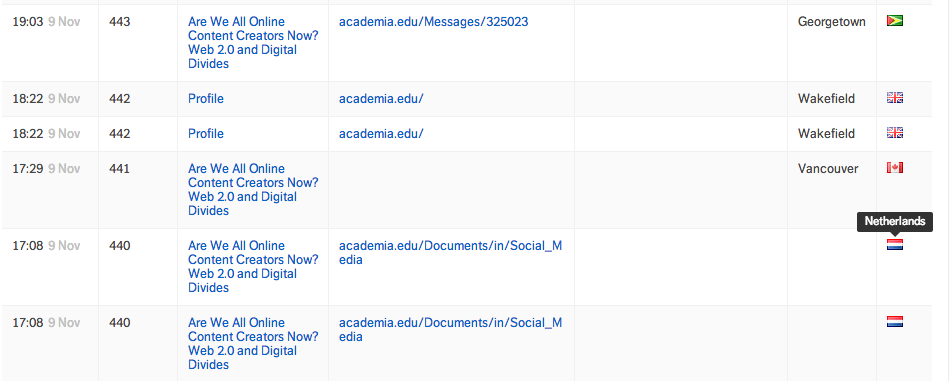Just as we are all finding out how much the government has been tracking our meta-data, a whole ecosystem of public-facing meta-data tracking services is arising, giving us the chance to measure our own activity and track the diffusion of our messages across the web. This is particularly noticeable when looking at Twitter but other social media also increasingly offer sophisticated analytics tools.
Thus it was that as my latest open access paper “Are We All Online Content Creators Now? Web 2.0 and Digital Divides” went live two days ago I found myself not just mentioning it to colleagues but feeling obliged to update multiple profiles and services across the web – Facebook, Twitter, academia.edu, Mendeley and Linkedin. I found to my surprise that (by tracking my announcetweet using Buffer) only 1% of the thousands I have ‘reached’ so far seem to have checked my abstract. On the other hand, my academia.edu announcement has brought me twice as many readers. More proof that it’s not how many but what kind of followers you have that matters most.
Pleasingly, from Academia.edu I can also see that my paper has already been read in Canada, the US, Guyana, South Africa, the Netherlands, Germany, Poland, and of course the UK.
The biggest surprise? Google can find my paper already on academia.edu but has not yet indexed the original journal page!
I will share more data as I get it if my fellow scholars are interested. Anyone else have any data to share?


David
I think you should keep tracking this for a while. There’s a sort of meta-paper, or at least meta-note in this.
J.
Comment by JohnB — 15 November 2013 @ 9:29 am
[…] output made easy Filed under:Academia, publishing, social media at9:22 pm A few months ago, I mentioned how academia.edu provides near-real-time tracking of visits and visitor demographics for any […]
Pingback by The blog of David Brake academic, consultant & journalist — 2 April 2014 @ 9:22 pm